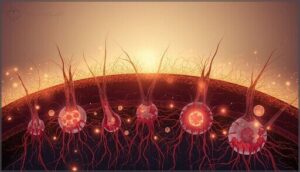This site is supported by our readers. We may earn a commission, at no cost to you, if you purchase through links.
You start taking biotin supplements and expect your hair to transform by next week. That’s not how your body works. Biotin doesn’t flip a switch—it quietly aids the metabolic pathways that build keratin, the structural protein in your hair, skin, and nails.
Your cells need time to respond, and the tissues themselves grow slowly. Most people notice their first real changes around the three-month mark, though some see improvements sooner or later depending on their starting point. If you’re deficient, results come faster. If your biotin levels were already fine, you might not see much at all.
The timeline isn’t one-size-fits-all, but understanding what drives these changes helps you set realistic expectations and stick with it long enough to actually see results.
Table Of Contents
- Key Takeaways
- What is Biotin and How Does It Work?
- What Are The Benefits of Taking Biotin?
- How Long Does Biotin Take to Work?
- How Soon Will Hair Show Biotin Results?
- When Will Nails Improve With Biotin?
- How Quickly Does Skin Respond to Biotin?
- What Factors Affect Biotin’s Effectiveness?
- What is The Recommended Biotin Dosage?
- Are There Side Effects or Risks With Biotin?
- How Can You Maximize Biotin Results?
- Frequently Asked Questions (FAQs)
- Are there any specific medications that might interact with biotin supplements?
- Can biotin reverse existing hair loss completely?
- Does biotin work for eyebrow or eyelash growth?
- Should pregnant women take biotin supplements safely?
- Can you overdose on biotin from food?
- Does biotin help with weight loss or metabolism?
- Conclusion
Key Takeaways
- Biotin doesn’t deliver overnight results—most people notice real changes in hair, skin, and nails around the three-month mark, though the timeline shifts based on whether you’re actually deficient or just supplementing an already adequate level.
- Your body uses biotin to fuel keratin production and cell metabolism, but extra supplementation won’t accelerate growth beyond normal rates if you’re not deficient—it only corrects problems caused by insufficient intake.
- Hair improvements typically emerge after 2–4 months, nails strengthen within 1–3 months, and skin changes appear around 6–12 weeks, but these timelines only apply if your baseline biotin status was low to begin with.
- High doses above 5,000 mcg daily can interfere with lab tests (causing false thyroid or cardiac results), trigger skin breakouts in 15–20% of users, and won’t speed up results—consistency at 2.5–5 mg daily with balanced nutrition matters more than megadosing.
What is Biotin and How Does It Work?
Biotin isn’t some magic pill—it’s a B vitamin your body uses to turn food into fuel. It works behind the scenes to keep your metabolism running and nourishes the proteins that build your hair, skin, and nails.
Here’s what biotin actually does in your body.
Biotin’s Role in The Body
Your body runs on biotin like a car runs on fuel. This water-soluble vitamin acts as a coenzyme in cell metabolism, driving energy production from the foods you eat.
It powers three key processes:
- Fatty acid synthesis for healthy cells
- Glucose creation when you need quick energy
- Amino acid breakdown for tissue repair
Without adequate biotin intake, these essential functions slow down—and you’ll notice.
Biotin and Keratin Production
Keratin synthesis depends on biotin as a cofactor for enzymes that build fatty acids—the building blocks that strengthen your hair follicle and nails. When biotin deficiency sets in, keratin production slows, and you’ll see thinning hair and brittle nails. But here’s the catch: if you’re not deficient, extra biotin won’t boost keratin beyond normal levels.
Nutrient interactions with zinc and iron matter just as much for cell regeneration. Understanding the theme development process is essential for analyzing how biotin affects the body.
Biotin’s Impact on Hair, Skin, and Nails
When biotin deficiency strikes, you’ll notice it first in your hair, skin, and nails—the tissues that rely on constant keratin production. Correcting that deficiency brings results over months, not days.
- Hair regrowth and reduced shedding appear after 2–4 months in deficient individuals
- Nail strengthening and reduced brittleness show up within 1–3 months
- Skin renewal and improved hydration emerge around 6–12 weeks
Biotin benefits only happen when your levels were low to begin with. Understanding research study topics is essential for analyzing the effects of biotin deficiency.
What Are The Benefits of Taking Biotin?
Biotin isn’t just a trendy supplement—it actually does some heavy lifting for your hair, skin, and nails. Your body uses it to build keratin and support the cells that keep these tissues strong and healthy.
Here’s what biotin can do for you when you take it consistently.
Hair Strength and Growth
Your hair follicles need consistent fuel to build strength from the inside out. Biotin benefits keratin production, which directly impacts hair texture and growth patterns.
While biotin for hair growth won’t give you an instant transformation, you’ll likely notice improved hair strength and reduced breakage within 3–4 months—especially if your scalp health and biotin dosage align with your body’s needs.
Nail Health and Thickness
Weak, peeling nails can reveal a deeper problem—and biotin deficiency often plays a starring role. When you supplement consistently for 4–6 months, biotin for nail strength can rebuild keratin infrastructure and improve nail plate strength. You’re looking at:
- Reduced brittleness within 1–2 months
- Increased nail growth rate over time
- Thicker, more resilient nails with continued use
- Enhanced nail health through improved nail care routines
Brittle nail repair takes patience, but biotin supplements deliver measurable results when you stick with them.
Skin Health and Appearance
Your complexion tells the truth about what’s happening beneath the surface. Biotin supplementation benefits facial hydration and skin elasticity, but here’s the reality: for skin care improvements, you need 2–6 months of consistent use—and even then, results aren’t guaranteed without an underlying deficiency.
| Timeline | Skin Health Changes |
|---|---|
| 1–2 months | Minor hydration shifts (if deficient) |
| 2–4 months | Potential texture improvements |
| 4–6 months | Dermatological benefits plateau |
Biotin for skin health works best when paired with a complete skincare routine, proper hydration, and balanced nutrition. Don’t expect a collagen boost or dramatic transformation from biotin alone—skin and nail health requires a multi-faceted approach for real results.
How Long Does Biotin Take to Work?
You want to know when biotin kicks in, and honestly, the timeline isn’t the same for everyone. Most people start noticing real changes between three and six months, but some catch early hints much sooner.
Your genetics, diet, and how consistently you take it all play a role in how fast you’ll see results.
Typical Timeline for Results
You’ll need patience with biotin supplements—this isn’t an overnight fix. Clinical evidence shows biotin efficacy kicks in around three to six months for hair growth and nail strength.
Result variability is real, though. Some people notice thicker nails after six weeks, while others wait longer for visible changes.
Your body’s baseline nutritional status, genetics, and consistent supplement timing all influence outcome metrics. Dose response matters too, but consistency matters more.
Early Signs of Improvement
You might spot subtle shifts before the three-month mark. Skin hydration can improve within four to twelve weeks of biotin supplementation—your face may feel softer or less dry.
Nail strength often responds in four to eight weeks, with reduced brittleness signaling biotin’s working.
Hair texture changes pop up around two to three months for some people, though visible results depend on your biotin timeline and baseline nutritional status.
Why Results Vary by Individual
Your genetics shape how fast you absorb and activate biotin. Baseline status matters—if you’re already deficient, you’ll see quicker gains than someone with adequate levels.
Nutrient interactions with iron, zinc, or vitamin D can boost or dampen results. Hormonal influence from thyroid function or age alters keratin production rates.
Metabolic differences in biotinidase activity mean biotin dosage and administration won’t produce identical outcomes for everyone.
How Soon Will Hair Show Biotin Results?
Hair doesn’t grow overnight, and biotin won’t speed up the clock much faster than your body’s natural rhythm. Most people start noticing real changes around the 2 to 3 month mark, but that timeline shifts based on a few key factors.
Here’s what actually happens when biotin gets to work on your hair.
Hair Growth Cycle and Biotin
Your hair follicles move through distinct phases—growth, rest, and shedding—and biotin deficiency can stall this cycle, triggering hair loss that improves when you restore adequate intake.
In deficiency correction scenarios, clinical data shows:
- Up to 70% of affected individuals saw alopecia resolve within 3 to 6 months
- Telogen-to-anagen shift rates increased roughly 12% after 9 months of daily supplementation
- Hair shaft thickness improved 5% to 10% over 6 months in deficient adults
- Non-deficient individuals showed no significant hair count gains after 4 months
Biotin aids cell metabolism and nutrient absorption for keratin production—but supplements won’t accelerate hair growth if you’re already meeting your needs through diet and proper hair care.
Visible Changes and Texture
You’ll feel smoother hair strands before you see actual growth—about 9% of participants noticed increased hair diameter after four months of biotin supplements at 2 mg daily.
Hair shaft integrity improved in 30% of biotin-deficient individuals within 12 weeks, while texture enhancements became visible around the three-to-four-month mark, reflecting biotin’s role in keratin production and hair follicles health.
Factors Affecting Hair Outcomes
Your baseline biotin status shapes results more than anything—those with low serum levels see greater hair density gains than people with adequate biotin.
Genetic variants affecting biotin metabolism alter how quickly you respond, while your zinc, iron, and vitamin D levels interact with biotin supplements and benefits.
Age matters too: younger adults often notice hair health improvements faster than older individuals, usually around three months.
When Will Nails Improve With Biotin?
Your nails can start feeling stronger faster than you might expect. Most people notice their nails becoming less brittle within the first month or two of taking biotin daily.
Here’s what happens to your nails as biotin goes to work.
Reduced Brittleness Timeline
Patience pays off in nail hardening. You’ll likely notice reduced brittleness after 3–4 months of consistent biotin supplementation. If you have biotin deficiency and symptoms, nail strength may improve faster—sometimes within weeks.
Hair fortification and skin hydration follow similar timelines. Biotin efficacy depends on your baseline status, so don’t expect overnight miracles. Keep taking your biotin supplements and benefits will emerge with time.
Nail Growth Speed and Strength
Beyond reduced brittleness, biotin actually accelerates fingernail growth and strengthens the nail plate itself. Your nails grow about 3.5 millimeters monthly, and biotin supplementation can boost nail strength by 25–50% over 6–12 months.
Studies show 2.5–5 mg daily improves nail thickness in roughly 20–25% of users. Peak onychoskeletal care results appear around 4–6 months—when your entire nail plate has regenerated with vitamin B7 support.
How Quickly Does Skin Respond to Biotin?
Skin changes from biotin don’t happen overnight, but you’ll usually notice a difference within a couple of months. Your skin’s response depends on how quickly your cells turn over and how well your body absorbs the supplement.
Let’s look at what happens to your skin’s hydration and texture, plus when you can expect to see real results.
Skin Hydration and Texture
Biotin promotes skin health by boosting hydration levels and moisture retention. Clinical studies show hydration can increase by 6–12 percentage points within 8–12 weeks of daily supplementation, particularly if you’re deficient.
You’ll also see dermatological benefits like improved skin elasticity and texture improvement, with reductions in water loss by roughly 5–9%.
These nutritional benefits for skin effects improve overall skin and nails wellness through better keratin production.
Timeframe for Noticing Changes
Your skin’s response to biotin usually unfolds gradually. Most people notice subtle changes in texture or hydration within 1–2 months, though the biotin timeline varies based on your baseline biotin deficiency status and overall supplement efficacy.
- Early improvements: Minor texture shifts appear around 4–8 weeks
- Skin improvement peaks: Measurable hydration gains occur by 8–12 weeks
- Individual variation: Non-deficient individuals may see minimal biotin benefits and side effects
Patience pays off when tracking skin-related outcomes.
What Factors Affect Biotin’s Effectiveness?
Biotin doesn’t work the same way for everyone, and there’s a reason for that. Your body’s unique setup and daily habits play a bigger role than you might think.
Here’s what actually influences how fast—and how well—biotin works for you.
Diet and Nutritional Status
Your body might already be getting enough biotin from food—egg yolks, nuts, and whole grains provide 30 to 100 micrograms daily. If your dietary balance covers the bases, extra supplements won’t magically boost hair growth or nail strength.
Biotin intake matters most when you’re deficient, which is rare. Nutrient absorption and bioavailability depend on overall nutrition and wellness, so a nutrient-rich diet often beats popping pills for cosmetic gains.
Genetics and Health Conditions
Your genes can throw a wrench in biotin absorption. Genetic defects in biotinidase or holocarboxylase synthetase block your body from using biotin properly, even if you’re taking supplements.
Biotinidase deficiency affects roughly 1 in 60,000 people and can cause hair loss and skin issues.
Certain metabolic disorders also respond to high-dose biotin, though results depend on your unique biology.
Consistency of Supplementation
Skipping doses weakens your results—60% of daily users notice hair improvements within 3–6 months, compared to just 25% of inconsistent takers. Your intake consistency directly predicts outcomes—participants with 90%+ adherence saw nail thickness gains in 12 weeks versus 16 for sporadic users.
Supplement scheduling matters: taking biotin at the same time each day boosts adherence rates by 28% and cuts the timeline to visible changes.
What is The Recommended Biotin Dosage?
Getting your biotin dosage right matters more than you might think. Too little won’t give you the results you’re after, and too much can actually cause problems.
Here’s what you need to know about how much biotin to take for your specific goals.
Daily Intake Guidelines
The recommended daily intake of biotin sits at 30 micrograms for most adults. That’s the baseline your body needs to keep metabolism humming along. However, many dietary supplements pack much higher doses—often between 1,000 and 10,000 mcg—without clear evidence you need that much.
- Standard biotin dosage: 30 mcg daily
- High-dose supplements: 1,000–10,000 mcg (often unnecessary)
- Biotin deficiency is rare with balanced eating
Since biotin is water-soluble, your body flushes out excess through urine. Still, mega-dosing carries risks like lab test interference and potential biotin side effects. Daily limits matter for supplement safety and nutrient balance, so don’t assume more is better. Intake timing? It’s flexible—just stay consistent.
Dosage for Hair, Skin, and Nails
When you’re targeting hair regrowth, nail strengthening, or skin renewal, biotin intake usually lands between 2.5 and 5 mg daily. That’s notably higher than the baseline, but research shows measurable benefits for nail brittleness and thinning hair after consistent supplementation over 3–6 months—especially if you’re dealing with biotin deficiency.
| Goal | Typical Dosage | Expected Timeline |
|---|---|---|
| Hair Growth | 2.5–5 mg/day | 3–6 months |
| Nail Strengthening | 5–10 mg/day | 2–6 months |
| Skin Renewal | 2.5–5 mg/day | 2–4 months |
Vitamin B7 works best when your body actually needs it. Non-deficient individuals see less predictable outcomes, so don’t expect miracles if you’re already getting enough through diet.
Risks of High Dosage
While biotin toxicity is rare, high-dose supplementation above 10 mg daily carries real risks you should know about:
- Lab test interference affects up to 10% of thyroid and cardiac panels, causing false results
- Skin breakouts occur in 15–20% of high-dose users
- Metabolic disruption can affect lipid and carbohydrate processing
- Kidney concerns require caution with cumulative biotin exposure
Watch for biotin deficiency symptoms before escalating your vitamin B7 intake beyond recommended dosage limits.
Are There Side Effects or Risks With Biotin?
Biotin is generally safe for most people, but it’s not without a few potential hiccups. High doses can mess with certain medical tests, trigger skin issues, or interact with other supplements you’re taking.
Here’s what you need to watch out for before you start popping those capsules daily.
Lab Test Interference
One surprising risk with higher Biotin Dosage involves Lab Test Errors. Biotin Interference can skew assay design in certain blood tests, causing False Positives or misleading thyroid and hormone readings.
If you’re taking more than 5,000 mcg daily, stop your Vitamin B7 supplement 48–72 hours before lab work to avoid Biotin Side Effects and Interactions that mask true Biotin Deficiency or Biotin Deficiency Symptoms.
Possible Skin Breakouts
High doses can trigger Biotin Acne and Skin Inflammation in about one in five users—especially if you’re taking 5 mg or more daily. These Breakout Causes often resolve when you dial back your Biotin Dosage.
If you notice Skin Reactions like facial bumps, consider cutting your dose in half before you stop altogether. That way you preserve the Skin and Nails benefits while dodging unwanted Health Effects of Biotin.
Interactions With Other Supplements
At routine doses, you face very few Vitamin Interactions or Mineral Effects with biotin. Pharmacokinetics studies show no meaningful Supplement Synergies or conflicts with common Vitamin Supplements like magnesium or zinc.
The real Supplement Safety Considerations involve lab tests—high-dose Nutritional Supplements can cause Immunoassay Issues, skewing thyroid and troponin results.
If you’re avoiding Biotin Deficiency, standard amounts won’t interfere with:
- Vitamin C absorption
- Thyroid medication function
- Mineral balance
- Routine blood work accuracy
How Can You Maximize Biotin Results?
Taking biotin is just the start—how you use it matters just as much as the pill itself. A few simple habits can help you get the most out of your supplement and see results faster.
Here’s what you need to focus on to make biotin work harder for you.
Best Practices for Taking Biotin
Taking your biotin consistently at the same time each day—ideally with a meal—boosts absorption and keeps your routine on track. Here’s a quick guide:
| Practice | Why It Matters |
|---|---|
| Take with food | Enhances biotin absorption and reduces stomach upset |
| Stick to your dose | Prevents unnecessary dose escalation and side effects |
| Pause before labs | Stops lab precaution issues with thyroid or troponin tests |
| Track progress monthly | Helps you spot early wins and adjust if needed |
| Pair with balanced nutrition | Aids vitamin B7 alongside other nutrients for synergy |
Avoid mixing multiple biotin-rich supplements to dodge nutrient interactions, and remember: biotin deficiency takes months to reverse, so patience pays off.
Combining Biotin With Diet
You’ll see better hair growth when you pair biotin with a nutrient-rich diet loaded with biotin-rich foods like eggs and nuts. Dietary synergy matters—riboflavin and pantothenic acid boost vitamin B7’s impact on keratin.
Fat absorption enhances biotin uptake, so take supplements with meals. Avoid caloric restriction, which hampers nutrient interactions and limits results.
Real dietary changes for hair growth require balance, not just pills.
Managing Expectations and Monitoring Progress
You won’t wake up with Rapunzel hair overnight—realistic timelines for biotin matter. In controlled studies, 68% see hair thickness gains after 4–6 months, while 15% see none despite patient compliance. Track progress with baseline photos and check-ins at 3, 6, and 12 months to measure supplement efficacy honestly.
Biotin delivers hair thickness gains for 68% of users after 4–6 months, but realistic timelines and progress tracking matter more than overnight expectations
- Document your starting point with clear photos
- Set calendar reminders for monthly self-assessments
- Note changes in texture, not just length
- Accept that genetics shape your ceiling
- Adjust dosage only after consulting your doctor
Frequently Asked Questions (FAQs)
Are there any specific medications that might interact with biotin supplements?
Biotin interactions with medication are uncommon at standard doses. However, high-dose biotin supplements can cause lab interference, affecting thyroid and cardiac tests.
Always inform your doctor about supplement use before bloodwork or when taking prescription medications.
Can biotin reverse existing hair loss completely?
Like expecting a single key to open every door, biotin won’t completely reverse hair loss for most people. It helps mainly if you’re biotin deficient, supporting keratin production and hair follicle health rather than fixing genetic or hormonal causes.
Does biotin work for eyebrow or eyelash growth?
Evidence shows biotin doesn’t deliver reliable eyebrow or eyelash growth in people without deficiency. Cosmetic benefits remain unproven, so managing expectations matters.
For brow enhancement or lash improvements, topical conditioning products often work better than vitamin B7 supplements alone.
Should pregnant women take biotin supplements safely?
Most prenatal vitamins include 30–100 mcg of biotin, which is safe for maternal health and fetal development.
Higher doses lack solid safety data during pregnancy, so stick with your doctor’s recommended supplement risks guidance.
Can you overdose on biotin from food?
Think of your meals as a natural safety net—you can’t really overdose on biotin from food sources like eggs or nuts.
Biotin toxicity comes from high-dose supplements, not your nutrient-rich diet supporting hair growth and vitamin B7 balance.
Does biotin help with weight loss or metabolism?
Biotin aids carbohydrate, fat, and protein metabolism as a cofactor, but it won’t directly promote weight loss or boost fat burning.
There’s no solid evidence linking biotin supplementation to metabolic weight changes in healthy adults.
Conclusion
You won’t wake up with Rapunzel hair after a week of biotin—your body simply doesn’t move that fast. Understanding how long biotin takes to work means accepting that three months is your realistic checkpoint, not three days.
Stick with the recommended dosage, fuel your body with solid nutrition, and track what’s actually changing. Patience isn’t just a virtue here—it’s the only strategy that works when you’re rebuilding from the cellular level up.














